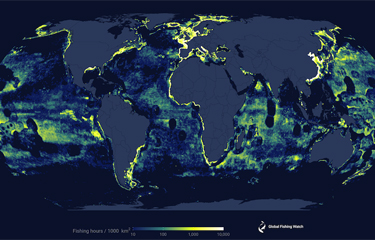Global Fishing Watch data has shown a significant drop in fishing effort last year, apparently correlated to global COVID-19 lockdowns.
Founded in 2015, Global Fishing Watch is a partnership between Google and the advocacy groups Oceana and SkyTruth that collects vessel location data from satellite images and tracking systems,
Global Fishing Watch recorded 18.4 percent fewer active Chinese-flagged fishing vessels and 10.7 percent fewer fishing hours in 2020 relative to 2018-2019. The decline among other fishing nations’ vessels was 5.4 percent and 4 percent, respectively. It’s not clear if the data counts China’s foreign-flagged vessels.
Tracking automatic identification system (AIS) signals from vessels, Global Fishing Watch has estimated that approximately 63,000 vessels collectively fished for over 50 million hours in 2020, down 9 percent and 5 percent, respectively.
The findings come as several delegates to China’s annual National People’s Congress meeting have called for more government support for overseas expansion of China’s fishing efforts.
Lan Ping Zhong, the chairman of Fuzhou Hong Dong Yuan Yang Fishing Co., which operates a fleet and a fishmeal plant in Mauritania, told reporters at this year’s NPC sitting that he wants China’s so-called policy banks – China Development Bank and the China Export Import Bank – to lend more money to fishing companies to help them expand overseas. The policy banks tend to lend to governments against natural resources like oil and gas and iron ore, which China requires, but Lan said they should work to develop special finance packages to help the seafood sector. Lan didn’t say if he thought fishing stocks might be taken as collateral against loans.
Lan’s comments were largely echoed by another NPC delegate, Daishan Fishing Cooperative Chairman Xia Yongxiang, from Zhoushan, China’s largest distant-water home port. Xia said he wanted China’s government to provide funds for the building of “comprehensive fishing bases” around the world to protect and service Chinese vessels. Like Lan, he described fishery bases as a valuable part of China’s Belt and Road Initiative, a blueprint for increasing China’s global trade footprint through infrastructure development.
In 2020, Chinese government financing and lending to BRI projects was greatly scaled back both due to the COVID-19 crisis and a shift in domestic spending priorities.







